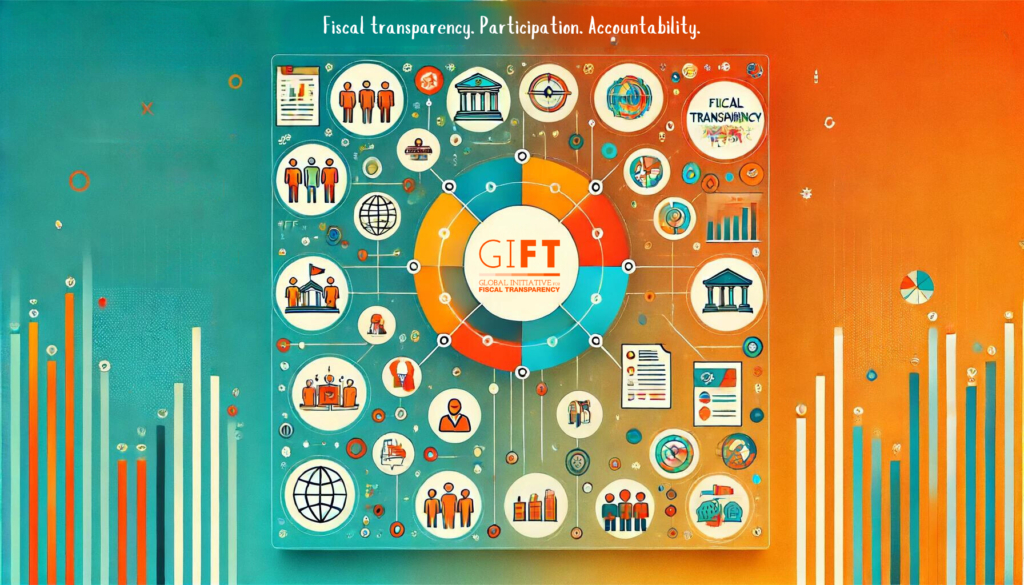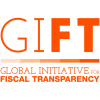Open Budget Survey 2023:
How did GIFT countries do?

Credit: Design elements generated with the assistance of Open AI, refined by Marianne Fabian.
The International Budget Partnership (IBP) recently launched the results of the Open Budget Survey (OBS) 2023. Conducted biennially since 2006, it is the only independent, comparative, and regular measure of budget transparency, public participation, and oversight worldwide2.
The Global Initiative for Fiscal Transparency (GIFT), a network dedicated to sustained and measurable improvements in fiscal openness, eagerly anticipates the OBS results every two years to see how countries within the GIFT network are performing among those surveyed. The latest OBS, released on May 29, 2024, covers 125 countries3. Of these, 21 are GIFT Stewards4. So, how did they do?
GIFT countries continue to excel in budget transparency, with five of the top 10 performers in the 2023 OBS. Georgia leads globally in 1st place, followed by South Africa in 4th, Mexico in 6th, Brazil in 7th, and Benin in 9th. Five more GIFT Stewards5 also rank in the top 20 percent of countries surveyed. In the 2023 survey, 12 stewards achieved budget transparency scores of 61 and above, a key benchmark indicating likely sufficient levels of budget transparency. Notably, all stewards, except Ukraine, which already had a score surpassing 61 in 2021, maintained this trend in 2023, suggesting some level of institutionalization in practices.
While some have not yet reached a score of 61, countries, such as Liberia, showed promising improvements from their 2021 score, demonstrating strong ongoing efforts to enhance fiscal transparency. Over 80 percent of the stewards exceeded the global average budget transparency score of 45 out of 100. Continuing this trajectory, it is likely that more GIFT countries will soon exceed the score of 61.
Unfortunately, a few GIFT stewards regressed, indicating a lack of institutionalization and the need for focused efforts in this area.
Public participation in the budget process
The global average participation score is a mere 15 out of 100, highlighting poor global performance in this area. However, 16 GIFT Stewards, or 76 percent, scored above the global average, with three countries—Dominican Republic, Georgia and South Africa—ranking in the top 10. Seven stewards placed in the top 20 percent of countries. Notably, some GIFT steward countries like Benin have demonstrated significant improvements since 2017, reflecting their success in maintaining or enhancing participation in recent years.
While these gains are commendable, the overall levels of public participation worldwide, including in GIFT steward countries, remain far too low. Furthermore, many countries have shown fluctuations in participation scores over the last four rounds of the OBS. This variability suggests that initiatives are often conducted on an ad hoc basis and lack sufficient institutional backing, possibly due to shifting priorities of different government administrations.
Significant sustained efforts are needed to ensure people have a voice in decisions throughout the budget cycle that affect their daily lives.
Way forward: Make fiscal openness practices more meaningful
The 2023 OBS results highlight both progress and challenges in budget transparency and public participation. While top performers set an inspiring example, significant improvement is needed, particularly in establishing meaningful fiscal transparency and inclusive public participation throughout the budget cycle. Importantly, improving fiscal openness should not merely be an exercise to increase assessment scores but should focus on providing quality information and spaces that enable meaningful contributions toward achieving development goals and reaping tangible benefits.
To achieve this, country reformers should use the OBS 2023 findings and recommendations to enhance their commitment to meaningful budget transparency, inclusive participation, and greater government accountability. Governments should provide comprehensive and accessible budget information and ensure lasting progress through the institutionalization of transparency efforts. High-performing countries should lead by example, sharing their strategies to help others improve.
Efforts should focus on creating and enhancing spaces where quality fiscal information can be used to make a difference on the ground. Inclusive public participation spaces should be available in all budget cycle stages—from formulation and approval to implementation, audit, and oversight. Creating more impactful spaces for public engagement is essential. This requires investing in the capacity building of ministries of finance, government entities, legislative bodies, and audit institutions. Maximizing learning circles and peer-exchange opportunities is also crucial. Governments can use a combination of digital and in-person approaches to create more inclusive and accessible opportunities for public engagement. Public participation practices must be institutionalized to ensure they are not dependent on the priorities of individual administrations.
In a world where civic space is shrinking, the need for this is greater than ever. Public participation spaces need to allow the voices of all citizens, especially the most marginalized, to be heard and considered in decision-making. This engagement enhances the legitimacy of fiscal decisions and fosters a sense of ownership and trust among the populace. This makes public budgets more responsive and accountable to citizens, reaping benefits for all.
Join us
We thus urge everyone—whether you represent a government, civil society organization, international partner, or are a member of the public—to join us in advocating for these essential reforms. Let us work together to establish a culture of meaningful transparency and inclusive participation in fiscal policies and decision-making. By doing so, we can help shape a world where openness and accountability are the norm, where public resources are allocated to meet the needs and priorities of communities towards the achievement of development goals, ultimately bridging the gap between governments and the people they serve.
[1] Marianne Fabian is Communications and Outreach Coordinator at the Global Initiative for Fiscal Transparency (GIFT); Raquel Ferreira is GIFT’s Network Manager.
[2] The OBS 2023 methodology can be found here: https://internationalbudget.org/wp-content/uploads/IBP-OBS-Methdology-Note-2023.pdf.
[3] Access the full compilation of Open Budget Survey reports at: https://internationalbudget.org/open-budget-survey/reports.
[4] GIFT Stewards countries are listed here.
[5] Dominican Republic, Philippines, Indonesia, United States, and Croatia.
